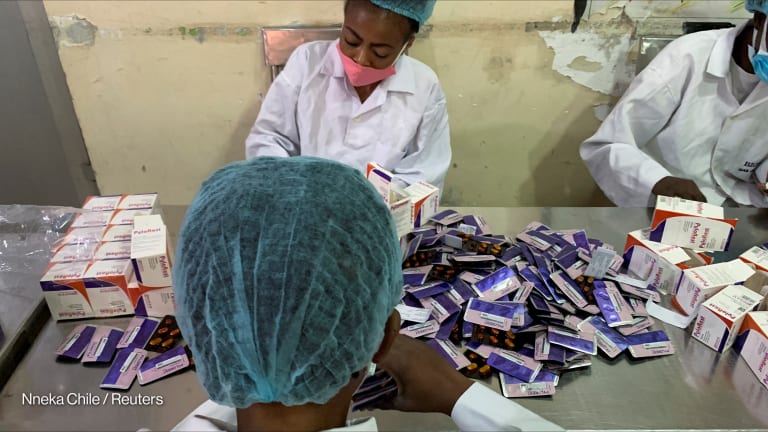
PATH, a global health NGO based in Seattle, Washington, is evolving its approach to innovation and partnerships to advance health equity.
Last month, PATH unveiled a new strategy that emphasizes the importance of “local science, local technology, and local industry.”
PATH works with local partners and ministries of health in 70 countries to improve public health through better use of data, evidence-based policy, and systems that deliver innovations to the most vulnerable people.
While its mission has not changed, with its new strategy, PATH has committed to elevating local expertise over the next five years.
“A lot of what we have included in the strategy is essentially how PATH has worked in the past, but we are aiming to do this much better,” Dr. Nanthalile Mugala, chief of the Africa region at PATH, told Devex. “What the new strategy does is to make us really intentional in the way we partner with local organizations.”
The COVID-19 pandemic could present an opportunity for the localization agenda, in which NGOs shift power to local and national actors. PATH is taking steps that could yield lessons for other international NGOs trying to make this shift.
Investing in local talent is key for PATH to ensure that its work on the African continent withstands the test of time, Mugala said.
“What is important is that we are able to sustain the initiatives that are introduced beyond the project mode,” she explained.
What's stopping localization in the humanitarian sector?
Despite localization being a focus of discussion for donors and NGOs, there has been limited progress in transitioning funding models to support local-led responses. But new data continues to show the value in change.
Local talent is also best positioned to understand — and be responsive to — priorities at the community and national level, said Mugala, who was a pediatrician at a hospital in Lusaka, Zambia, and president of the country’s National Pediatric Association.
PATH’s local teams on the African continent can bid on awards that bypass PATH’s U.S. and European offices. This leads to more effective partnerships because they are better able to assess public health needs in the communities where they work, Mugala explained.
International NGOs such as PATH have to strike a balance between hiring talented people and ensuring they’re not drawing them away from local organizations that can’t pay as much. But PATH’s local hires are “still a resource” for their ministries of health, she said. Mugala led PATH’s work in Zambia before going on to oversee its work across the continent, where 600 of PATH’s 1,600 international employees are based.
What they’ve learned during the pandemic has helped to shape PATH’s new strategy.
“As we gathered input from our partners, we also heard a clear and resounding call for INGOs like PATH to work differently and help move the sector toward a more equitable and effective model,” PATH explains in its new strategy. PATH’s partners encouraged the NGOs to focus on health systems strengthening, saying it was the only way out of this pandemic and the only way to avoid the next crisis.
“COVID has shown us what can happen when power and resources and investment are not evenly distributed,” Mugala said. “A lot of our countries are struggling because the health care systems are not set up to handle epidemics of such magnitude. Personally, I’m hopeful that we don’t see something similar to COVID in the near future, but I think that’s just hope. Anything can happen, and so I think what we’re all learning is we should all be better prepared to respond to emerging threats in the future.”
Preparing for and responding to emerging health threats is one of PATH’s three strategic priorities moving forward, along with improving lives with science and technology, and increasing health system capacity and resilience.
And while COVID-19 has been a priority for PATH, as it has been for other global health NGOs, Mugala also highlighted other diseases that are “still ravaging communities,” including malaria, communicable and noncommunicable diseases, and antimicrobial resistance.
To enable its new strategy, PATH is prioritizing things like trusted relationships, which the NGO will need to leverage as it works to leverage local assets in a more systematic way.
On most projects, PATH is the lead and works with local organizations as subcontractors.
Moving forward, Mugala said, PATH will seek more opportunities to raise money together with local partners, who would then take the lead on projects, managing funding and implementing activities with PATH playing a supporting role.
PATH will also look for more opportunities to better position local organizations to receive their own funding.
“If there are funding opportunities where local organizations can work, where we can take a backseat, we will do that,” Mugala said.
PATH is developing an equity checklist that will push the NGO to prioritize local partnerships and develop a transition strategy at the outset of projects.
This coverage, presented by the Bay Area Global Health Alliance, explores the intersection between technology, innovation, and health. How are tech, innovation, and cross-sector partnerships being leveraged to accelerate equitable access to health care?









